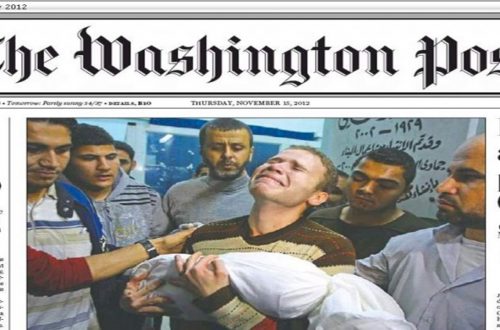This is a guest-post from Alex Stein of falsedichotomies.com
The tear-gas canister which killed Bassem Abu Rahmeh is a lethal weapon. I know, because I’ve held it in my hands. A few weeks ago, protesting the near-fatal injuring of Tristan Anderson under similar circumstances, I joined a small gathering of protesters at the Ministry of Defence in Tel Aviv. There, someone showed me one of the canisters. It was a dense rock of blackness, and it wasn’t hard to imagine the consequences of firing it at high velocity in the direction of a human body. In case you don’t take my word for it, I should mention that one of the soldiers present at the demonstration warned us to be careful with the canister. “Be careful,” he said. “That could hurt somebody”.
The IDF has stated that Rahmeh was killed when a soldier from the Armored Corps fired a tear gas canister at him from a distance of a few dozen meters. This, we are told, was unauthorized fire. These canisters, only recently introduced, are supposed to be fired in the air from greater distances. They are supposed to be used to distribute tear-gas, not as projectiles to harm civilians. It is reasonable to assume that, like me, the soldier held the canister in his hands before firing. It is also reasonable to assume that he was aware of previous incidents where the canisters have caused serious injuries. Unless some bizarre event made him accidentally fire off his canister in Rahmeh’s direction (who was, in turn, beckoning the soldiers at the time), it seems clear that canister was fired in full knowledge of and despite the fact that it could quite easily kill someone. This is murder.
It is also a disgrace. Nearly twenty Palestinians have now been killed at protests against the Separation Barrier over the past few years. I once attended the weekly protest at Bilin, and witnessed the tit-for-tat theatrical violence, the rocks (themselves potentially a lethal weapon, although not to the same degree as the canisters), hurled at the soldiers by a small minority of the crowd, the inevitable brute response from the army, tear-gas whizzing around like so many fireworks, rubber bullets occasionally rippling away in the Friday afternoon sky. Needless to say, the army does not use similar force when dealing with provocations from the settlers. The fields of the West Bank seem to have turned into some kind of grotesque experiment regarding how violent you can get with a largely unarmed crowd, themselves protesting the illegal and immoral theft of their land at the hands of the Israeli state, a theft occasionally ruled illegal by the Supreme Court, although with precious little change on the ground (And, yes, I agree that Israel’s security needs justify a Separation Barrier. But far, far closer to the green line.)
To clear up the Hebrew translation: Today, ever soldier is an accomplice to murder. I wrote it and meant it. I have never been particularly opposed to the notion of collective responsibility; if the idea of the nation’s army has any meaning then one soldier’s actions bring the entire structure into disrepute. The bad apple theory can only be used to explain so much, particularly in the case of Bil’in. When a battalion wins a crucial battle the entire army celebrates its victory as its own. What’s the difference here?
Whoever is responsible for dealing with the demonstrations at Bil’in isn’t doing their job properly. This, and not anti-Semitism, is the reason Israel’s image is dragged through the mud. We all know who the enemies of this country are and we all know with how much glee they receive desperate stories such as these. But if you’re really concerned with the future of Israel, your priority should first be to denounce the apologists and the whitewashers, those who would piddle over tiny details when the overarching narrative of the event is once more far too clear. Good friends tell the truth. Bassem Abu Rahmeh was murdered last week by the Israeli Defence Forces. How many more will die before we realize the transparent insanity of our current policies?


